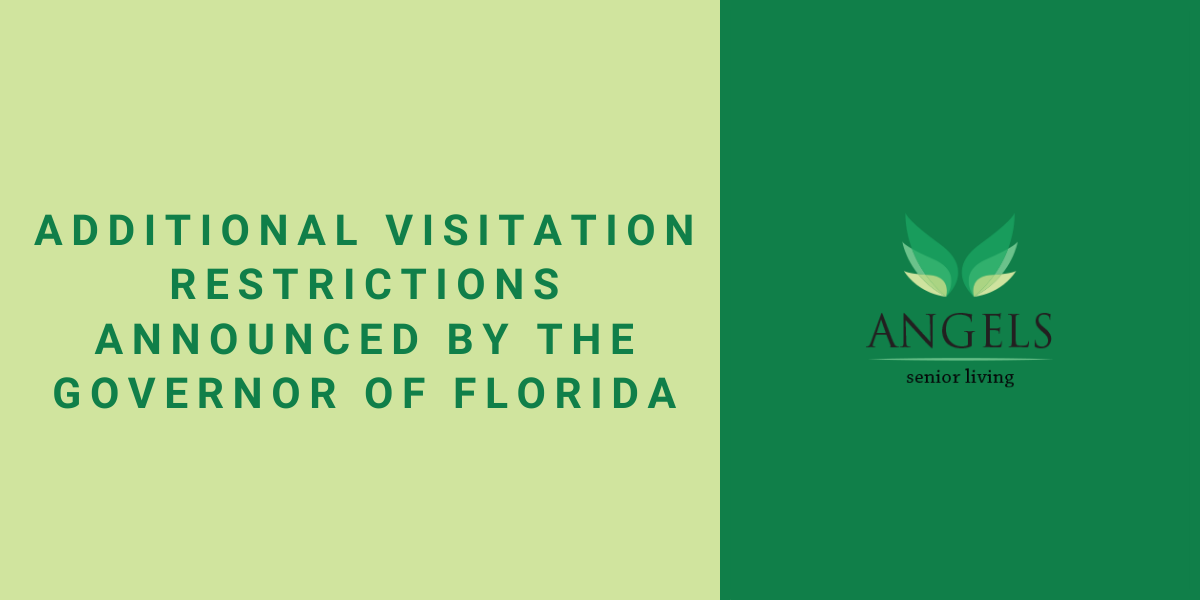Per the order of the governor, limitations are in effect for visitors to nursing homes and assisted living facilities during the COVID-19 outbreak. Our communities continue to adhere to best practices recommended to us by the Centers for Disease Control, Florida Governor, and Florida Surgeon General, and we appreciate your support during this time. If you meet any of the following criteria, you will be refused admission to our communities:
- Anyone infected with COVID-19 who has not received two negative tests
- Anyone showing symptoms of COVID-19 (fever, cough, shortness of breath)
- Anyone who’s come in contact with an infected individual can’t visit the above facilities within 14 days of coming in contact with that individual
- Anyone who’s traveled internationally must wait at least 14 days from your return before visiting the above facilities
- Anyone who’s traveled on a cruise ship must wait at least 14 days from your return before visiting the above facilities
- Anyone who lives in a community where coronavirus has been confirmed must wait at least 14 days after exiting your community before visiting the above facilities
Below, please find a list of resources on stopping the spread of COVID-19 and what Angels Senior Living is doing to protect our residents and their families, as well as a letter from Robert Bennett, our COO.
__________
COVID-19 Resources
Angels Senior Living Implementing Visitation Restrictions Regarding COVID-19
Strategies to Prevent the Spread of Coronavirus (COVID-19)
What to do if you are sick with coronavirus disease 2019 (COVID-19)
__________
Letter from Robert Bennett Regarding Visit Restrictions
To Our Residents, Family Members, and Visitors:
There is a growing concern about the spread of COVID-19. The office of the Governor issued an Executive Order directing the Florida Department of Health to issue a Public Health Emergency. In addition, Governor Ron DeSantis announced to temporarily prohibit visitation to nursing homes, assisted living facilities, adult family care homes, long term care facilities and adult group homes.
At this time, we do not have any cases in our facilities. As a precaution, if there is no reason for you to come to the community, we encourage you not to visit for the next 14 to 30 days. We understand that connecting with family members is incredibly important, and there are a variety of ways you might consider connecting with them. These may include telephone, email, text, FaceTime, Skype or Facebook.
Additionally, the following groups of people are prohibited from entering our communities.
- Anyone showing signs of a respiratory infection. Those symptoms include cough, fever, sore throat, runny nose, and/or shortness of breath.
- Any person who traveled internationally must wait 14 days from their return to the U.S. before visiting.
- Anyone who has been in a community with confirmed “common spread” of the virus must wait 14 days from the time they left the community before visiting.
- Any person infected with COVID-19 who hasn’t had two consecutive negative test results cannot visit our communities.
- Anyone who has been in close contact with a person infected with COVID-19 who has not tested negative is prohibited from visiting for 14 days.
- Anyone who has been infected with COVID-19.
- Any person who traveled on a cruise ship must wait 14 days from the date of their return before visiting.
We ask that upon arrival at one of our facilities, please check in with our front desk to answer a brief questionnaire and to receive handwashing and Coronavirus education. If you wish to arrive before or after the visiting hours, please call the community Administrator to advise us and we will schedule a screening upon your arrival. We also request that pet visits be suspended for the time being.
Ensuring residents are cared for in a safe and healthy environment is our greatest concern. Angels Senior Living is in close contact with the local and state health department, as well as the Agency for Health Care Administration and are following their guidance.
We will notify you if any residents or staff are diagnosed with COVID-19. Should you have any questions, please feel free to contact us at any time.
Sincerely,
Robert S. Bennett
Chief Operating Officer
Angels Senior Living






